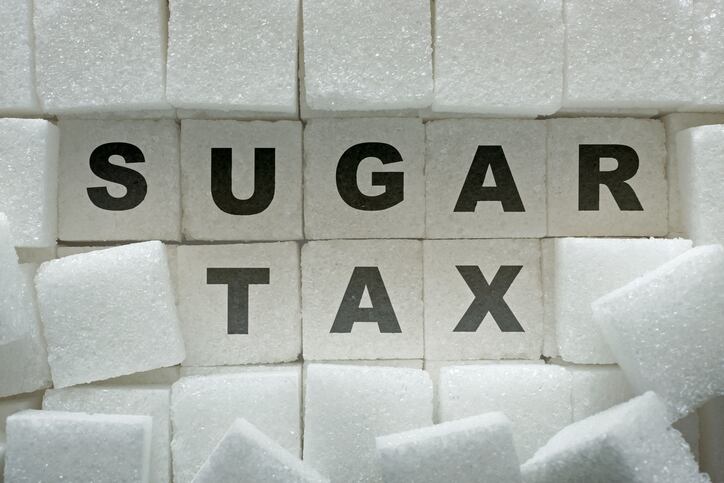Soda may contain large amounts of added sugar - but so do many confectionery and bakery items. The beverage industry has long argued that it's been singled out unfairly. So would taxes on foods work?
The question is back in the limelight as public experts in the UK call for the UK's Soft Drinks Industry Levy (largely seen as a successful example of a sugar tax in that it's reduced sugar consumption and prompted industry-wide reformulation) to be extended to cakes, biscuits and chocolate.
Why are beverages taxed?
Beverages are a common target for sugar taxes for a number of reasons. Firstly, they are often products with ‘empty calories’ – products that contain calories for no nutritional gain. And in many countries, they represent a top contributor of sugar in people’s diets.
Over-consumption of sugar in diets is a well-known problem: linked to a large range of problems from obesity to diabetes.
And with most people understanding that soda and sugary drinks are unhealthy, it’s also a relatively easy policy to ‘sell’ to the population (a 2021 study in the BMJ found high support for the UK’s Soft Drink Industry Levy).
No longer a novel policy tool, there are 108 sugar-sweetened beverage taxes in place at a national level: ranging from the UK to Mexico to South Africa (in the US, taxes are decided at a local level with soda taxes in places such as Oakland, California; Berkeley, California; Seattle, Washington; and Cook County, Illinois)
It follows, then, that other sugary categories are becoming targets for sugar taxes.
Taxes on candy and chocolate
Some countries do already have sugar taxes on items other than beverages. Most of these put chocolate and confectionery in the firing line.
Bermuda’s sugar tax extends to food products containing cocoa and added sugar. Dominica has a tax on sweets, candy and chocolate bars. Finland taxes candy and ice cream. Hungary taxes pre-packaged foods with high sugar, such as chocolates, condiments and jams.
In the US – where taxes are decided on a state level – Colorado has a tax on candy.
In a similar way, other taxes target fat as well or instead of sugar: as per Colombia's tax on ultra-processed foods.
But such taxes are still relatively rare, and the evidence of the benefits of taxing products high in fat, salt and sugar is still limited.
Most taxes on HFSS foods lead to decreases in consumption
Hoping to address the question, researchers from Imperial College London set out to review a collection of 20 studies on health taxes on HFSS foods around the world.
They focused on taxation of four food categories: energy-dense snacks (a common target for food taxation) confectionery, bakery items, and high-fat foods.
What they found was that the effectiveness of taxes on high-fat and high-sugar foods varied: although a majority demonstrated a decrease in the purchase and consumption of taxed products.
Mexico’s HFSS tax – which taxes non-essential energy-dense food - has been statistically significantly associated with reduced HFSS consumption. Sugar consumption decreased by 2 %, taxed food consumption saw a 3 % reduction and sales of taxed items decreased by 5.10 %. Specifically, sales of candies, chocolates, chips, and salty snacks, as well as cereal-based sweet foods, decreased by 5.4 g/week.
The HFSS tax in Hungary was associated with a reduction in consumption by −3.4 % and reduced sales between −6% to 12 %.
In Denmark, two studies showed a statistically significant reduction on consumption of taxed foodstuffs between −4% to −6%.
What was particularly important was the existence of subsidies on healthier alternatives.
“When taxes were coupled with incentives for nutritious choices, such as subsidies on whole grain alternatives, dairy with no added sugar, fruits, and vegetables, there was a more substantial reduction in the consumption of taxed snacks and a notable increase in the uptake of healthier substitutes,” noted the researchers.
Unsurprisingly, broad taxes were more effective than those that singled out a single product, as they stopped people simply substituting one food for another.
“This observation underscores the importance of considering the scope of taxed food items, as broader taxation may discourage unhealthy food substitutions more effectively, contributing to positive shifts in dietary habits.”
Colombia: World's first tax on ultra-processed foods
In November 2023, Colombia introduced a world-first tax on ultra-processed food. The tax imposes an initial tax rate of 10% on certain foods, which increases to 15% this year and will rise again to 20% in 2025.
The tax applies to ultra-processed 'junk food': that is, products formulated from food-derived substances along with additives, that contain added sugars, sodium, and saturated fats that exceed thresholds for these nutrients (For free sugars, the threshold is >10% of total energy; and the threshold for saturated fats is similarly >10% of total energy.)
Products that fall under the tax include milk products with added sugar; sausages and cold cut meats; confectionery; snacks; bakery products; breakfast cereals; canned fruits and vegetables with added fat, sugar or salt; and spreads, condiments and seasonings. Sugary drinks are also taxed under a separate set-up.
While it's early days for the tax, data from Kantar suggests that volume sales in 2023 were down 5% compared to 2021.
Will UK extend sugar tax?
In the UK, public health experts are calling for the Soft Drinks Industry Levy to be extended to cakes, biscuits and chocolate.
Researchers from Queen Mary University of London analysed two UK policies designed to make food healthier between 2015 and 2020: the SDIL and a voluntary sugar reduction program. The tax on sugary drinks delivered a 34.5% fall in total sugar sales.
In contrast, voluntary sugar reduction - which had hoped to achieve a 20% reduction - only delivered a 3.5% reduction.
"Confectionery, cakes and biscuits are major sources of added sugars in many diets, and performed poorly in the sugar reduction program," said Dr Kawther Hashem, lecturer in public health nutrition at Wolfson Institute of Population Health, Queen Mary University of London. "Implementing levies on this products could reduce sugar consumption and promote healthier alternatives."
The sticking points?
Arguments against extending sugar taxes to foods follow those made by soda tax critics for years: a hit on employment, livelihoods (across manufacturing and further back the supply chain) and economic growth.
Smaller producers may also be more vulnerable to these factors (although many sugar taxes do contain exemptions or special rules for smaller producers).
Sugar taxes do encourage producers to reformulate: but often with artificial ingredients, which aren't always viewed positively. Or consumers may simply replace taxed products with other equally unhealthy ones (in fact, the experimental implementation of a fat tax in New Zealand ended up being associated with a rise in sugar purchases).
Focusing the policy correctly
The most successful taxes have been ones that focus on improving public health rather than government revenue.
Denmark introduced a tax on saturated fat on meat and dairy products in 2011, only for it to be repealed less than 12 months later: with its target on revenue rather than health cited as a key reason for its failure by the Imperial College researchers.
The tax, however, did have other flaws which are often cited as reasons against sugar taxes: one of those being that citizens simply made the short journey over the border to a neighboring country to make their purchases.
Whether the government should interfere in individual choices or not is one of the most basic debates around unhealthy food taxation.
However, the costs of obesity arising from unhealthy dietary choices makes a strong counterargument: it has been estimated that the total cost of high obesity rates to health services globally is $990bn per year.
The arguments come down to how effective taxes are and aren't - and most researchers agree that taxes need to be carefully targeted and designed specifically for each market for the best results.




